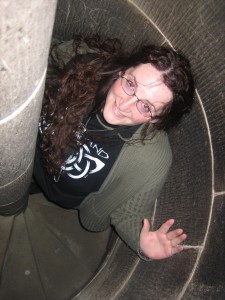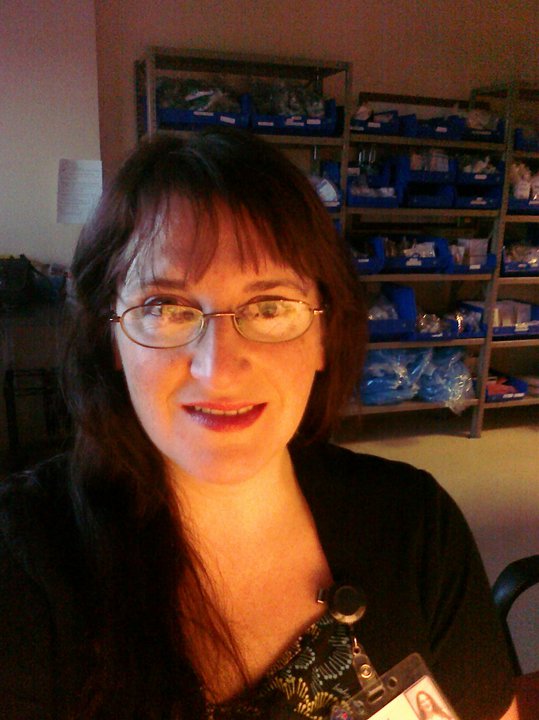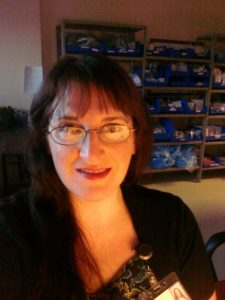A guest post by Heidi Wilde.
As soon as I discovered the existence of books and realized that human beings wrote these precious passports to lands unknown, I knew that I wanted to be a writer. The span between that realization and the present day I like to call My Rationalized Life (sounds better than My Wasted Life, don’t you think?). A little over two years ago, I decided that if I was ever going to be a writer I needed to get serious.
At first I thought that becoming a writer would involve a lot of time locked in my room, alone. That I needed to sequester myself away from “real life” in order to get in touch with my Writer Self. It’s a romantic notion, and you do need focused, concentrated time for your writing, but I found that merely sitting alone with my laptop wasn’t getting me very far. I started looking online for inspiration, tips, advice and stumbled into the world of Conventions and Workshops and all manner of Enticing Gatherings.
I try not to do anything in half measures and my first foray into this strange land was no different. I found a workshop that was held in conjunction with Dragon*Con and involved submitting a short story or the first chapter of a manuscript to the author who was running the 3 day workshop. It popped my eyes wide open, let me tell you. It also introduced me to the idea that writing is a community effort. Yes, when it comes down to it, the only one who can tell your story is you, but we aren’t meant to walk the path from inspiration to fruition alone.
My second convention experience was attending LTUE (Life, the Universe, and Everything – a speculative fiction symposium) where I became acquainted with a group of people who were interested in forming a writing group. I’d never had a writing group and I was a little nervous about how it would all work. I mean, these people would expect me to submit my writing. I would be expected to critique theirs! It was all very new and scary to me, so of course I jumped aboard.
In the beginning these people were strangers. They held no familial obligation to tell me my writing was good. They were going to give me what they wanted me to give them in return; honesty and ways to improve. If you aren’t currently in a writing group and have any interest in publishing – or at the very least improving – your work, I highly recommend finding a group.
There are a few things to consider when you begin searching for a group. First, you need to figure out what you want to get out of being in a group. Do you have a few projects that are nearly finished? Just need those extra set of eyes? Do you want to develop better critiquing skills? Do you need moral support for your writing addiction? A place where people speak your language? Know what you want/need so you can communicate those things to prospective groups.
Every group dynamic will be different; you need to find the one that fits you best. Trust me when I tell you you don’t want a group whose only feedback is that everything you write is awesome. This may sound like a good thing, and at times we do need to cosset our egos, but how much will you improve if you’re never told how or what needs improving? On the flip side, you should avoid groups that make you contemplate suicide at the end of each session. Moderation in all things, right? This is just as applicable to writing groups as to anything else. Find a group where you feel safe to submit, but also challenged to improve.
Don’t forget, writing groups are as much about what you can offer the rest of the group as they are about what you can gain from them. Make sure you are willing to read other people’s submissions and give them your honest feedback. Again, moderation. Don’t hang in the shadows for too long, but don’t expect that the spotlight is there just for you.
Be sure you are ready to accept and (where you deem appropriate) apply criticism. Once you have decided what story you want to tell, listen to your group’s comments to make sure you are telling the story you want to be. There is no need to make every change suggested by your group (that is one good way to lose your story), but if you hear the same comment from multiple sources you need to pay attention. A problem area is being highlighted. Somewhere along the way what you meant to say and what you actually said became two different things. Whether or not you use any suggestions you receive on how to fix the problem, the section needs to be fixed.
In addition to writing groups, I found that attending seminars and workshops help your craft as well as get you out mingling with people “in the know”. Yes, I’m talking about networking, rubbing shoulders, brushing elbows, playing footsie. No matter how nervous the idea of actually speaking to other people may make you, it is a very important piece of the pie.
The best experiences I have had with this aspect of writing have been during Superstars Writing Seminars. I could write a long post full of effusive praise for this seminar, but since this post is already quite lengthy, I’ll just mention one thing. This is where the budding thought of community that I received at the Dragon*Con workshop and watered during LTUE fully bloomed and bore fruit. Never in my wildest dreams did I image Superstars such as Kevin J. Anderson, Brandon Sanderson, Rebecca Moesta, Dave Farland, Tracy Hickman, Eric Flint and James Owen would claim me as a member of their Tribe, but they did.
Of the millions of things these wonderful authors said that touched me, the one that really changed my outlook on this business of writing was when Kevin told us to look around at the rest of the attendees. “These people are not your competition; they are your comrades.” Build your Tribe. Work on your writing, of course, but especially develop strong relationships with your fellow writers, editors, publishers, agents – and yes, even those I.P. attorneys (hey, we all need love) and you’ll find fulfillment and success in this insane, scary, wonderful world of writing.
Heidi Wilde Bio: 
Heidi A. Wilde is a Respiratory Therapist by night and aspiring author by day. She spends her nights dragging people back from the brink of death, but she has dedicated her daylight hours to the pursuit of all things writing. Current projects include a Children’s “How to” Poetry book, a Regency romance series as well as a foray into the realm of Steampunk. She attributes the bulk of what knowledge she can claim to attendance in fabulous programs such as Superstars Writing Seminars, Dave Farland’s workshops and various conventions.



